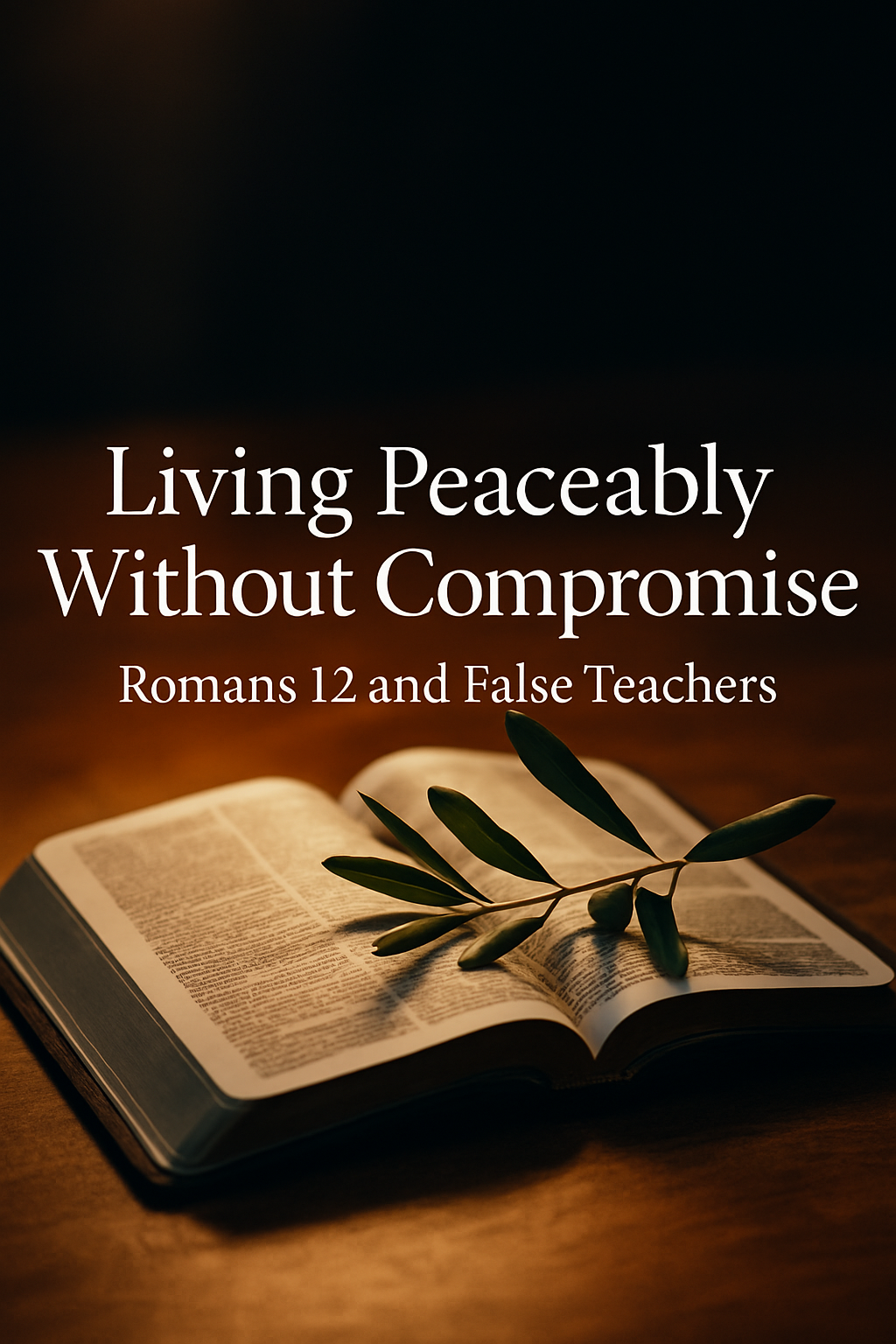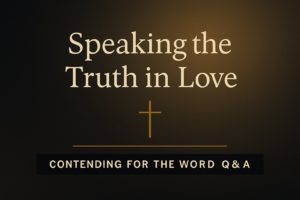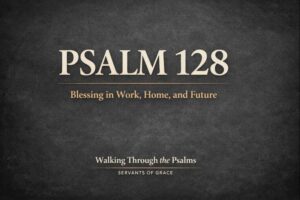⏱️ Estimated Reading Time: 7 min read
Living Peaceably Without Compromise, Romans 12 and False Teachers
Series: God’s Design for the Local Church and the Life of the Believer
Author: Dawn Hill
Date: September 22, 2025
“If possible, so far as it depends on you, live peaceably with all.” Romans 12:18 ESV
My pastor has read Romans 12:9-21 numerous times for our local church benediction. This passage is referred to in the ESV as the “marks of a true Christian”, and it is a personal favorite in reflecting on my own life and walk with Christ. One of the verses that has stood out to me recently is verse 18. I have meditated on it when considering some comments from opposing views when discussing practices and teachings coming out of the New Apostolic Reformation. One of the most common objections that I hear in questioning the leaders associated with this movement is that I am bringing division to the body of Christ and that I am void of the Spirit of God and a Pharisee. Another comment centers around agreeing to disagree and even poses these questions, “Why can’t you make peace with “so and so”? Why do you have to attack their teaching? He/she is a brother/sister in Christ. “
This leads me back to verse 18. Are we to make peace with false teachers and false prophets? Verse 18 says, “If possible, so far as it depends on you, live peaceably with all.” I appreciate what this one commentator says regarding this verse, “When making “peace” is possible only by compromising the truth, or the commands of God (Acts 5:28–29), then peace is simply not possible, and the choice no longer depends on us.” I do believe that we should not go around picking fights for the sake of being quarrelsome, as this is unbiblical and unfruitful (Proverbs 20:3, 26:21, 2 Timothy 2:23-24, Titus 3:9). As a Christian, I am to demonstrate the fruit of the Spirit in my life, which includes peace and long-suffering (Galatians 5:22-23). At the same time, making peace ends where false doctrine and heresy begins. Here is the question to consider: How do we make peace with false teachers/false prophets when they are at enmity with God? Thomas Watson seems appropriate to quote pertaining to this topic,
“The wicked may have something which looks like peace, but it is not. They may be fearless and stupid; but there is a great difference between stupefied conscience, and a pacified conscience. . . . This is the devil’s peace; he rocks men in the cradle of security; he cries, Peace, peace, when men are on the precipice of hell. The seeming peace a sinner has, is not from the knowledge of his happiness, but the ignorance of his danger.” (A Body of Divinity [Carlisle, Pa.: The Banner of Truth Trust, 1986 reprint], p.262).
The use of “if possible” and “so far as it depends on you” indicates that there may be times with fellow believers and with unbelievers that peace is not possible. This situation could require us to demonstrate humility and long-suffering with others and to “agree to disagree”. However, this is not the case with false teachers/false prophets. We cannot agree to disagree on essential doctrines and even aberrant practices and teachings that lead away from the truth of the Word of the God. We certainly cannot make peace with those who would add to or distort the gospel of Jesus Christ. One example is those who would say that the full gospel requires miracles, signs, and wonders to be performed in order to be complete. Paul warned the church at Galatia of those who would come to them with another gospel, stating that whoever would do so is to be accursed (Galatians 1:6-9). That is not a state of peace with God or with those who are His.
Scripture does not instruct us to make peace with false teachers and false prophets doctrinally, and the reason we cannot is because that is not true peace. Rather, it is a false peace and a false unity. The prophet Isaiah spoke on behalf of the Lord of there being no peace for the wicked (Isaiah 48:22, 57:21). The New Testament warns of those who would cause divisions and create obstacles to the doctrine taught in His Word. We are to mark and avoid them (Romans 16:17-18). The reason that we cannot listen to them is because they do not serve Jesus Christ. False teachers are also spoken of by Peter as those who bring swift destruction upon themselves, their condemnation from long ago not idle and their destruction not asleep (2 Peter 2:1,3). These people are waterless springs and mists driven by a storm, and the utter gloom of darkness has been reserved for them (2 Peter 2:17).
Is there any way to make peace with false teachers and false prophets? Doctrinally, no. Civilly, yes. Romans 12 goes on to tell those who are in Christ how to conduct themselves with regards to their enemies. Pertaining to matters where we are personally wronged, we are not to seek our own vengeance, and if our enemy is in need of something to eat or to drink, we are to offer these things to them (Romans 12:20-21). We are to pray for our enemies and for those who would persecute us and revile us for the sake of Christ (Matthew 5:43-45, Luke 6:27-28). 1 Thessalonians 5:15 says, “See that no one repays anyone evil for evil, but always seek to do good to one another and to everyone.” Notice that this is not only to be done to brothers and sisters in Christ, but to all. We can only know how to do good through God’s Word.
Though false teachings and heresies are grieving and can insight righteous indignation, it is also important to conduct ourselves in such a way that we glorify Christ in our conduct. We acknowledge that God is just, and we also acknowledge that He has been merciful towards us in bringing us from spiritual death and God’s wrath to adoption as sons of God and the promise of eternal life, by grace through faith in Christ Jesus. Personally, I do not want anything less for a false teacher or a false prophet than what He did in forgiving me and granting me repentance and true saving faith in Him alone.
I realize that there are those who refuse to hear the truth or to turn from their ways because Scripture says that they will not. At the same time, we do not know which ones will and which ones will not. We are simply to proclaim the truth and to trust the Lord that He is the One who saves and redeems. We cannot compromise the truth of God’s Word, which includes our personal conduct as citizens of God’s household. If you ever get the opportunity to show mercy and grace to a false teacher, show them this grace and proclaim the gospel to them. Call them to repentance and to flee the wrath of God. Pray that God would be merciful and that they would be spared of standing before God on the day of eternal judgment and torment. May we continue to fight the good fight of faith as we stand with sure footing upon the foundation of our faith.
Listen to this episode pertaining to this blog post: Can We Make Peace with False T… – The Lovesick Scribe Podcast – Apple Podcasts
For more from Dawn visit her page here at Servants of Grace or at our YouTube.
Dawn Hill is a Christian blogger known as The Lovesick Scribe, and the host of The Lovesick Scribe Podcast. She is passionate about sharing the truth and pointing others back to Jesus Christ through the written Word as the standard of authority for Christian living and instruction while being led by the Holy Spirit into maturity. She is the author of NonProphet Woke: The Reformation of a Modern-Day Disciple. She writes articles for Christianity.com, Servants of Grace, and her blog posts have been shared by individuals such as Tim Challies. She will be featured in the upcoming docuseries, American Gospel: Spirit and Fire. She co-leads a women’s support group with Emily Massey called Snatched from the Flames, where they minister to women who have come out of the hypercharismatic and New Apostolic Reformation movement. She is a wife to Nicholas and a mother to Anabel and Ephraim. You can follow her on The Lovesick Scribe and Instagram.




